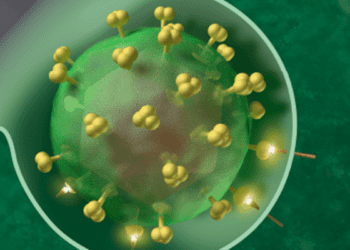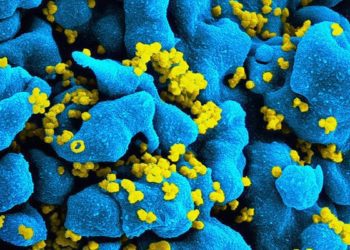Replacement of recipient hematopoietic cells with donor cells may be a major factor in HIV remission after allo-HSCT
1. Allo-HSCT treatment resulted in significant prolonged reduction in HIV-1 viral reservoirs.
2. Mouse models showed adoptive transfer of peripheral CD4+ T cells to immunosuppressed mice resulted in no rebound of the viral load.
Evidence Rating Level: 2 (Good)
Study Rundown: While combination antiretroviral therapy (cART) has been highly successful at reducing morbidity and mortality associated with HIV, it has not been proven to completely eliminate the virus, as a latent HIV-1 viral reservoir often remains. One therapy, allogeneic hematopoietic stem cell transplant (allo-HSCT), has been proposed as a potential treatment poised to eliminate the HIV-1 virus. The authors of this study aimed to investigate the mechanism of HIV-1 eradication associated with allo-HSCT. They observed that the replacement of recipient hematopoietic cells with donor cells may be a major factor in HIV remission after this treatment. The main limitation of this study was its small sample size.
Click to read the study in Annals of Internal Medicine
Relevant Reading: Allogeneic stem cell transplantation for HIV-positive patients with hematologic malignancies
In-Depth [nested case series]: The authors of this study conducted a nested case series within the IciStem observational cohort—the largest observational cohort for the study of HIV reservoir dynamics. The goal of the study was to further elucidate the mechanism of HIV-1 eradication related to allo-HSCT. Study outcomes included HIV DNA analysis, HIV RNA analysis, and quantitative viral outgrowth assay. Furthermore, the authors used a humanized mouse model for in vivo detection of the replication-competent blood cell reservoir. Six participants from the cohort met study criteria, and of these participants, five had a full donor chimera in T cells within the first year after transplant and undetectable proviral HIV DNA in blood and tissue. Furthermore, HIV was undetectable in CSF and cells from bone marrow, lymph node, and ileal biopsy specimens.
Image: PD
©2018 2 Minute Medicine, Inc. All rights reserved. No works may be reproduced without expressed written consent from 2 Minute Medicine, Inc. Inquire about licensing here. No article should be construed as medical advice and is not intended as such by the authors or by 2 Minute Medicine, Inc.





![Gene therapy targets Duchenne muscular dystrophy in new trial [PreClinical]](https://www.2minutemedicine.com/wp-content/uploads/2018/10/70_lores-75x75.jpg)

